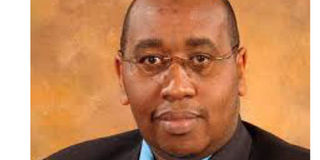Rebuild foreign exchange reserves, IMF tells government

BoU executive director of research Adam Mugume. File photo
Kampala- The International Monetary Fund (IMF) has told Uganda to rebuild its foreign exchange reserves which have dropped in order to manage better other economic shocks that may occur.
The reserves have registered a decline after Bank of Uganda (BoU) used some part to stabilise the foreign exchange market due to the Shilling depreciation.
Government has also used part of the reserves for building the Karuma and Nsimbe dams.
The two power projects saw government withdraw $300m (Shs9.945b) from the Central Bank, contributing to the projects as was spelt out in the 2015/16 Budget.
This development saw the level of Uganda’s foreign exchange reserves slightly declining in the second half of 2015 to about $2.8b (Shs9.282 trillion) from $3.1b (Shs10.2 trillion)
Foreign exchange reserves act as a buffer to support a country’s ability to withstand external ecenomic shocks.
IMF economists say it is important for a country to have strong reserves to shield the economy against adverse shocks.
In an interview with Daily Monitor recently, IMF senior resident representative to Uganda Lucia Ana Coronel said even though BoU has occasionally engaged in interventions to prevent excessive volatility in exchange rates, foreign exchange reserves have been kept at comfortable levels.
Ms Coronel said: “To this end it is crucial to build reserves in good times to be able to use them when bad times come, for instance when commodity prices fall, demand for exports slow down, or there is tight liquidity in the market.”
Talking to Daily Monitor recently, BoU executive director research Adam Mugume said: “Our reserve cover is equivalent to four months of import cover. The East African Community macroeconomic convergence criteria require us to have 4.5 months of import cover by 2021 before joining a single currency area.”
On building a reserve, Dr Mugume said: “Building foreign exchange reserves requires a central bank to purchase foreign exchange from the domestic market because by purchasing international reserves, the central bank would be exchanging domestic assets for foreign assets.”
Like any other bank does, BoU does purchase or sell foreign exchange in the market depending on the prevailing economic environment.




